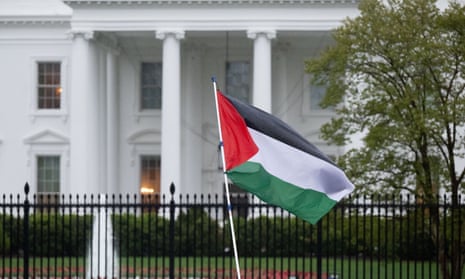My old boss Chuck Schumer, the Senate majority leader, bravely said recently what Joe Biden has been afraid to: “Palestinian civilians do not deserve to suffer for the sins of Hamas, and Israel has a moral obligation to do better. The United States has an obligation to do better.”
The ongoing violence, Schumer noted, threatens not just the lives of Palestinians but the security of Jewish people worldwide by alienating global allies appalled by the bloodshed. If Benjamin Netanyahu refuses to desist, he concluded, the US must start “shaping Israeli policy by using our leverage” – which obviously includes military, diplomatic and economic aspects.
What drove Schumer to such an unprecedented interference in Israel’s domestic politics is the appalling humanitarian devastation inflicted on Gaza. Whether or not one believes genocide has occurred, the death rate in Gaza has equaled or exceeded that in three other recent cases that US presidents did call “genocide”. Americans may reject such comparison on grounds that Israel is responding in self-defense to terrorism. But they probably are unaware that historically the vast majority of genocides, unlike the Holocaust, similarly have been responses to rebel or terrorist attacks – including in the three most recent cases.
In Darfur in 2003, the rebel Sudan Liberation Army launched surprise attacks that killed hundreds of Sudanese soldiers and took others hostage. Sudan responded by targeting non-Arab villages in Darfur accused of supporting and hosting the rebels. From late 2003 to early 2004, government forces and associated militias killed up to 10,000 civilians per month, and displaced about 2 million civilians, leading to more deaths from deprivation. In September 2004, the George W Bush administration declared the violence “genocide”.
In Myanmar’s Rakhine province in 2017, the Arakan Rohingya Salvation Army killed border guards and launched terrorist attacks that killed more than 100 civilians and took others hostage. Myanmar responded by attacking Muslim areas suspected of supporting the rebels. Late that year, government attacks killed about 7,000 civilians during the most intense month of conflict, and displaced more than 1 million. In 2022, the Biden administration formally declared Myanmar guilty of “genocide”.
China, starting last decade, reacted to years of terrorist attacks in Xinjiang by detaining in re-education camps at least 1 million civilians – mainly Muslim ethnic Uyghurs – and interfering in their reproduction. Even in the absence of government massacres, the Donald Trump administration declared in January 2021 that China’s actions constituted “genocide”.
In all three cases, the foreign governments claimed to be responding in self-defense to terrorist attacks by rebels, who in turn said their attacks were motivated by prior oppression. The US government, in each case, declared the response to terrorism a genocide because it disproportionately harmed civilians.
This pattern is now repeating in the Middle East. On 7 October 2023, Hamas attacked Israel from Gaza, killing more than 1,100 soldiers and civilians, and taking more than 200 hostages, which they justified as a response to decades of expulsion, occupation and oppression. Israel retaliated by attacking Gaza so indiscriminately that nearly 20,000 Palestinians, mainly civilian, were killed during the first two months alone. In January, a US official stated that “more than 25,000 civilians have been killed” (although in fact official figures from Gaza’s health ministry do not distinguish between civilian and non-civilian deaths). Gaza officials now say the toll exceeds 33,000 people. Netanyahu himself has conceded 28,000 deaths.
Israel’s peak monthly killing rate of civilians in Gaza is roughly equivalent to that in Darfur, and higher than in the other two recent cases, all of which our government labeled “genocide”. Israel’s attacks have also displaced the vast majority of Gaza’s more than 2 million civilians, a human flood similar to or exceeding that in the other cases. Israel’s constraints on humanitarian aid have inflicted the highest starvation risk anywhere in the world in decades, according to the UN.
Israel’s violence is clearly excessive to its understandable goals of punishing and debilitating a terrorist group, as can be illustrated by comparison. In 2017, the US attacked and defeated the Islamic State in Iraq and Syria – which held much more territory including densely populated cities – but the US rate of civilian killing was less than one-tenth, 500 per month at most.
Why has Israel targeted whole apartment blocks and neighborhoods when hunting for only one or a handful of Hamas personnel? As in Sudan, Myanmar or China, the answer is not just deterrence but dehumanization. Ask yourself: if a Hamas fighter were hiding under an apartment block of Jewish people in Israel, would the Israel Defense Forces destroy the entire building to kill him? Of course not, but it did so in Gaza because Palestinian lives are devalued.
It brings me no pleasure to make these observations. I’m Jewish. My parents made Aliyah to Israel, where my brother was born and where I still have dozens of relatives. I am not antisemitic, nor do I oppose the existence of Israel. But facts are facts.
Ironically, many now defending Israel’s retaliation in Gaza were previously vocal opponents of similar responses to terrorism by Sudan, Myanmar and China – which they called genocide. I hope they will think about that.
Alan J Kuperman is a professor at the University of Texas at Austin, where his research focuses on the causes and prevention of genocide. In the 1990s, he served as legislative director for then representative Charles Schumer
